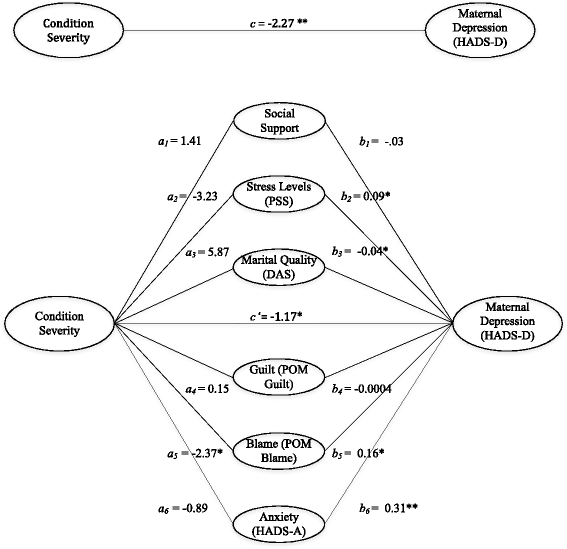Predictors of caregiver depression and family functioning after perinatal stroke
- PMID: 26174779
- PMCID: PMC4502550
- DOI: 10.1186/s12887-015-0397-5
Predictors of caregiver depression and family functioning after perinatal stroke
Abstract
Background: Perinatal stroke is a leading cause of cerebral palsy and lifelong neurological morbidity. Studies on perinatal stroke outcomes are increasing, although examinations of its broader impact on parents and families have been limited. A recent study found that parents of children with moderate and severe outcomes have increased risk for psychosocial concerns, including depressive symptoms and poor family functioning. Other parents adapt remarkably well, but how this occurs is unknown. The primary aim of this study was to examine predictors of parent and family outcomes, namely caregiver depression and family functioning. The secondary aim was to explore potential mediators and moderators of the relationship between condition severity and parent and family outcomes.
Methods: Parents were recruited from a large, population-based perinatal stroke research cohort, and they completed measures assessing their demographics, social supports, stress levels, marital quality, feelings of guilt and blame, psychological well-being, and family functioning. Bivariate analyses compared these variables. Predictor variables, mediators, and moderators were chosen according to the strength of their relationship with the outcome variables (i.e., caregiver depression and family functioning) and theory. Hierarchical regression, mediator, and moderator analyses were conducted accordingly.
Results: A total of 103 parents participated in this study (76 mothers, 27 fathers; mean age of 39.2 years; mean child age of 7.46 years). Condition severity, anxiety, social support, and blame independently predicted caregiver depression while condition severity, stress levels, and marital quality independently predicted family functioning. Blame regarding the cause of their child's condition also mediated the relationship between condition severity and caregiver depression.
Conclusions: Adverse parental outcomes can be predicted in perinatal stroke populations. Moreover, anxiety and stress management techniques, marital support, and psychoeducation regarding the unpreventable nature of perinatal stroke may be utilized in the future to enhance family outcomes.
Figures
References
-
- Raju TNK, Nelson KB, Ferriero D, Lynch JK. Ischemic perinatal stroke: summary of a workshop sponsored by the National Institute of Child Health and Human Development and the National Institute of Neurological Disorders and Stroke. Pediatrics. 2007;120(3):609–16. doi: 10.1542/peds.2007-0336. - DOI - PubMed
Publication types
MeSH terms
Grants and funding
LinkOut - more resources
Full Text Sources
Other Literature Sources
Medical
Research Materials


